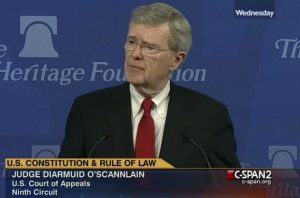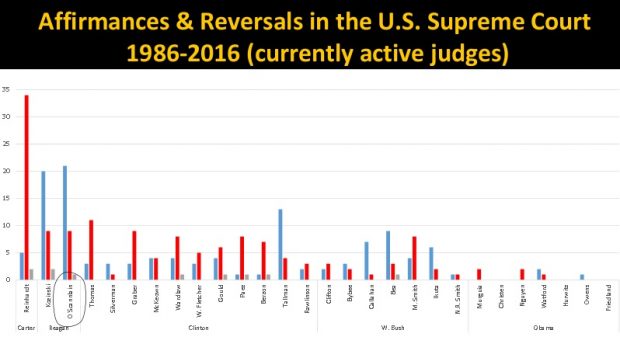A Leading Light Of The Federal Judiciary Will Take Senior Status By Year's End
An influential jurist is stepping away from the fray.

Judge Diarmuid F. O’Scannlain (via CSPAN)
The U.S. Court of Appeals for the Ninth Circuit, the nation’s largest and busiest federal appellate court, has shown signs of shedding its historical liberal activism and moving toward the center.
Alas, at the end of this year it will lose, as an active judge, one of its most influential voices for judicial restraint. Here’s the news, as reported yesterday by OPB:

Navigating Financial Success by Avoiding Common Pitfalls and Maximizing Firm Performance
One of Oregon’s most senior and powerful judges is announcing Monday he will take a less active role on the 9th U.S. Circuit Court of Appeals.
Judge Diamuid F. O’Scannlain is moving to senior status after 30 years on the court, which serves Oregon, Washington and seven other states. His move at the end of the year will open an Oregon spot on the court that the new president will have an opportunity to fill.
(I actually learned of this over the weekend, when I attended the 30th anniversary reunion for former clerks to Judge Diarmuid F. O’Scannlain, aka “DFO.” But the news was embargoed until Monday; hence this late report.)
The 79-year-old jurist has been a conservative foil on a court dominated by liberals. The Supreme Court often reverses the 9th Circuit and on many occasions has specifically cited O’Scannlain’s dissents as reasoning.
Here’s a slide that one of my fellow ex-clerks presented at the reunion, showing the track records of different Ninth Circuit judges at SCOTUS (click to enlarge):
Sponsored

Is The Future Of Law Distributed? Lessons From The Tech Adoption Curve

Legal AI: 3 Steps Law Firms Should Take Now

Generative AI In Legal Work — What’s Fact And What’s Fiction?


Generative AI In Legal Work — What’s Fact And What’s Fiction?

Judge O’Scannlain, third from the left, has a strong ratio of affirmances (blue) to reversals (red). Other judges with more blue than red are, from left to right, Judges Alex Kozinski, Richard Tallman, Jay Bybee, Consuelo Callahan, Carlos Bea, Sandra Ikuta, Paul Watford, and John Owens. (Most of those judges were appointed by Republican presidents, but note that Judges Watford and Owens were appointed by President Obama; they get shout-outs from former Bea clerk Ben Feuer in his recent Los Angeles Times piece as examples of moderate Obama appointees.)
Judge O’Scannlain is often labeled “conservative” — and, let’s not be disingenuous, he certainly is — but he belongs to the old-fashioned school of judicial restraint, as opposed to the new school of judicial engagement (which places heavy weight on liberty when interpreting the Constitution). As Judge O’Scannlain told OPB, “What bothers me is that a lot of people think courts can decide fundamental public policy questions. In my view, [they] should be settled by Congress or the state legislatures, where you have people who are actually elected.” So this is why, as a judge, he has rejected legal challenges to both bans on physician-assisted suicide and laws permitting the practice.
What does Judge O’Scannlain’s going senior mean for the Ninth Circuit? First, it opens up another spot for the new president to fill in 2017. It will be hard to find as staunch a conservative as DFO — just as it will be hard to find as staunch a conservative as Judge O’Scannlain’s late friend, Justice Antonin Scalia — but our new president and Senate will determine just how much of a shift takes place. Indeed, assuming no movement on the nomination of Judge Lucy Koh before the end of the year, the new president will have the opportunity to fill four vacancies on the court.
Second, it removes a major player in the court’s en banc process. The Ninth Circuit goes en banc much more frequently than other circuit courts, but it does so in a different way; because of the court’s size, which would make an en banc court look like a mini-legislature, the en banc panel consists of the chief judge and ten other randomly selected active judges. Senior judges are not eligible to sit on the en banc court (unless they sat on the panel whose decision is being reviewed). Nor can senior judges vote on whether to rehear a case en banc (which requires a majority of active judges to vote in favor). As an active member, Judge O’Scannlain was a major player in the en banc process; as a senior member, he won’t have the same influence. Senior judges can still make initial calls for en banc review and participate in the discussion over whether to grant rehearing, but that’s about all they can do.
Sponsored

The Business Case For AI At Your Law Firm


Navigating Financial Success by Avoiding Common Pitfalls and Maximizing Firm Performance
Third, his departure represents a major blow to the continuing effort to split the Ninth Circuit, a large and sometimes unwieldy court. Over the years, Judge O’Scannlain was one of the most eloquent and persistent voices in favor of breaking up the court into two smaller courts (just as the Fifth Circuit was split to create the Eleventh in 1980).
Fourth, for those who care about such things, it will most likely reduce the number of clerks that the Ninth Circuit feeds into Supreme Court clerkships. If you look at the various lists of feeder judges, you’ll see Judge O’Scannlain on pretty much every one. He and Judge Alex Kozinski generally vie for the honor of being the court’s top feeder (with two of their more liberal colleagues, Judge William Fletcher and Judge Stephen Reinhardt, filling out the list). It’s possible for a new judge to become a feeder — see, e.g., the emergence of Judge Watford — but it usually takes a little while.
On a personal note, I thank Judge O’Scannlain for being such a great mentor and friend over the years. As a lawyer turned blogger, I am in some ways the “black sheep” of the clerk family — my fellow former clerks are now law firm partners, law professors, federal prosecutors, even a judge — but I have always been welcomed by judge and his family. (And quite a family it is; the judge and his delightful and fabulous wife of many years, Mrs. Maura Nolan O’Scannlain, have eight wonderful children and nineteen grandchildren.) I can cite 1999, when the judge invited me to join his family on Christmas Eve when he heard I had no plans that night (I wasn’t flying home until Christmas Day); 2015, when the judge co-hosted (with his fellow Pioneer Courthouse judges) an informal reading group for my Ninth Circuit novel, Supreme Ambitions (affiliate link); and last weekend, when the O’Scannlains welcomed me and all my co-clerks back to Portland for the reunion.
There is sometimes a stereotype that conservatives are mean, but in my admittedly anecdotal experience — and to make a gross overgeneralization — conservatives are nicer than liberals. I would cite Judge O’Scannlain as Exhibit A. He can sometimes be harsh in opinions when it comes to arguments he disagrees with, but in person he is unfailingly warm, gracious, and kind. As noted by OPB, Judge O’Scannlain is “known for his friendliness and courtly manners.”
With Judge O’Scannlain, the personal is not political. For example, although Judge O’Scannlain opposed same-sex marriage as a matter of constitutional law (prior to Obergefell), that position in no way changed how he treated his many LGBT clerks (and I do mean many; upon information and belief, he’s had more LGBT clerks than even the longer-serving Judge Reinhardt, liberal lion of the Ninth Circuit). Last year, Judge and Mrs. O’Scannlain traveled across the country to attend my wedding, which meant a great deal to me and my husband.
The Ninth Circuit won’t be the same after Judge O’Scannlain goes senior. But after 30 years of dedicated service to the federal judiciary and the nation, DFO has certainly earned some R&R.
Influential Federal Appeals Judge From Oregon Reduces Role [OPB]
Ninth Circuit’s O’Scannlain Will Take Senior Status [The Recorder]
Influential 9th Circuit judge will shift to half-time [Oregonian]
Ninth Circuit Judge Taking Senior Status [Courthouse News Service]
Ninth Circuit Judge Diarmuid O’Scannlain to Assume Senior Status
[U.S. Court of Appeals for the Ninth Circuit (press release)]
Earlier: Is The ‘Nutty Ninth’ Circuit Coming To Its Senses?
David Lat is the founder and managing editor of Above the Law and the author of Supreme Ambitions: A Novel. You can connect with David on Twitter (@DavidLat), LinkedIn, and Facebook, and you can reach him by email at dlat@abovethelaw.com.








